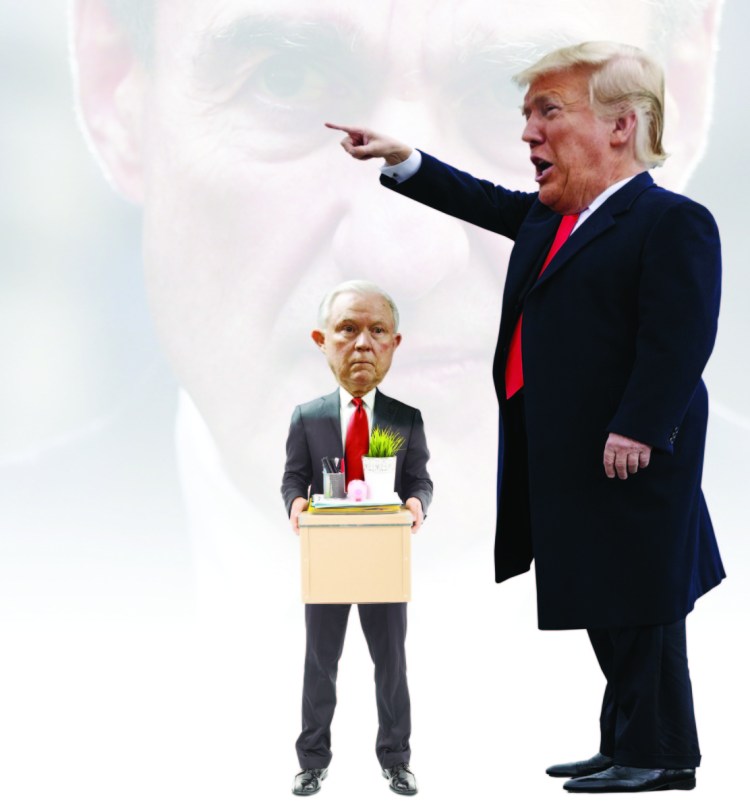On Wednesday, at President Trump’s request, Attorney General Jeff Sessions submitted his resignation. Sessions’ chief of staff, Matthew Whitaker, will take over as acting attorney general. This news set off a full-blown freakout among those who see this as the first step in a Nixonian plot to shut down special counsel Robert Mueller’s investigation. Nationwide protests were quickly organized in response to the move, and social media exploded with cries of a constitutional crisis. But although it’s true that Sessions’ departure is worrisome, there’s no need to panic – at least not yet.
Sessions, of course, had recused himself from the Russia investigation, which led to Deputy Attorney General Rod Rosenstein taking over supervision of that case. There have already been some suggestions that Whitaker may need to recuse himself as well, based on public statements he has made about the investigation and his relationship with those who could be implicated in the probe. But whether it’s Whitaker or a newly appointed attorney general, the fear is that this person might fire or at least undermine Mueller. I’m not sure those fears are justified.
Let’s be clear: The only thing that has happened at this point is that Sessions is gone. And Trump has wanted to get rid of Sessions for some time; no one is shocked at his departure. The real surprise is that Sessions lasted this long, given the public ridicule and disdain he endured from the president. And it’s common for presidents to reshuffle their Cabinets following midterm elections, so there is nothing inherently suspicious about the timing.
Regardless of who is attorney general, there are safeguards in place to protect the special counsel. The governing regulations give Mueller a good deal of autonomy and ensure that he is not subject to day-to-day supervision by any Justice Department official – which is precisely the point of having an independent special counsel.
It’s true the attorney general can deny Mueller the authority to take particular investigative steps. But the attorney general must notify Congress about any such denials and provide an explanation. If he wants to remove the special counsel, he could do so only for misconduct, dereliction of duty or other good cause, and again would have to provide an explanation to Congress. That notice goes to both the majority and minority parties – and as of January, of course, the majority in the House will be the Democrats, who will not be shy about responding.
In short, the attorney general, whoever he or she is, can’t just “disappear” the special counsel’s investigation – Congress has an oversight role. Actually, if Trump’s goal was to get rid of Mueller, it would have been much smarter to do this months ago, when a much more pliant Congress would have been less interested in objecting.
We can also take heart in the Justice Department’s demonstrated ability to maintain its independence when it comes to political investigations, even in the current climate. For example, much to Trump’s displeasure, last summer the department indicted two Republican members of Congress only a few months before the election (although, remarkably, that did not stop one of them from being re-elected by almost 9 points, while the other appears to have narrowly hung on to his seat).
Sessions was a Trump loyalist and advocate during the campaign but stood up to Trump as attorney general. Whitaker has expressed some strong personal views about the Mueller investigation, but we shouldn’t just assume the former U.S. attorney will simply ignore the Justice Department’s traditions and policies and roll over for Trump when his former boss refused to do so. And any new permanent attorney general will have to be confirmed by the Senate, where even some Republican senators are likely to demand assurances about the protection of the special counsel.
Finally, this investigative train is already far down the tracks. It’s not clear Trump can derail it even if he tries. Mueller is not a Washington naif; he likely has been preparing for this possibility for some time. He has already farmed out collateral areas of his inquiry to other federal prosecutors in the Southern District of New York. Additional indictments or reports might be largely completed, and that work will not simply vanish. Recall that even when President Richard Nixon ordered independent counsel Archibald Cox fired, the investigation did not just go away – and we all know how that ended for Nixon.
The justice system is bigger than any one person. Trump fired James Comey as FBI director, but the Russia investigation kept rolling. He can try to get rid of Mueller, but he can’t get rid of the entire Justice Department. Trump clearly would like to have Mueller fired and his entire investigation shut down. But he has found he has far less ability to bend the rule of law to his will than he might have imagined.
The Justice Department’s handling of the Mueller investigation has been a shining example of something in this administration that is working the way it is supposed to work. Strong institutional norms within the Justice Department have supported that investigation and resisted presidential battering. If we see actual evidence that this is changing, I’ll be the first to join those who are already storming the barricades. But for now, I’m keeping my powder dry.
Send questions/comments to the editors.



Success. Please wait for the page to reload. If the page does not reload within 5 seconds, please refresh the page.
Enter your email and password to access comments.
Hi, to comment on stories you must . This profile is in addition to your subscription and website login.
Already have a commenting profile? .
Invalid username/password.
Please check your email to confirm and complete your registration.
Only subscribers are eligible to post comments. Please subscribe or login first for digital access. Here’s why.
Use the form below to reset your password. When you've submitted your account email, we will send an email with a reset code.